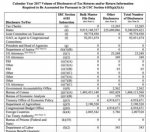One tiny little problem with this idea.
The 4th covers personal property. IRS records are government records, not the personal property of the individual.
Your belief would be shot down in flames in court, hence why the OLC didn't even attempt to go there.
Not so fast. The IRS considers your private information, your property and is protected.
10.5.1.2.7 (03-23-2018)
Privacy Act Information
The Privacy Act of 1974 (Privacy Act) forms the core of IRS privacy policy. It provides certain safeguards for an individual against an invasion of personal privacy by requiring federal agencies to:
(a) Collect, maintain, use, or disseminate any record of identifiable personal information in a manner that ensures that such action is for a necessary and lawful purpose.
Your identifiable personal information and the right to personal privacy precludes any claim of who owns the document.
The Privacy Act applies to agency records retrieved by an identifier for an individual.
The term “record” includes, but is not limited to, education, financial transactions, medical history, and criminal or employment history and that contains name, or the identifying number, symbol, or other identifying particular assigned to the individual, such as a fingerprint or a photograph is protected under the Privacy Act of 1974.
And under such Privacy Act information protected includes:
10.5.1.2.4 (03-23-2018)
Tax Information
The term tax information refers to a taxpayer’s return and return information protected from unauthorized disclosure under IRC § 6103. The law defines return information as any information the IRS has about a tax return or liability determination. This return information includes, but is not limited to, a taxpayer’s:
Identity.
Income, payments, deductions, exemptions, or credits.
Assets, liabilities, or net worth.
Tax liability investigation status (whether the IRS ever investigates or examines the return).
Constitutionally Required Disclosures — Some situations require disclosure of information, including SBU data, such as criminal cases where the IRS has a constitutional obligation to disclose,
upon the defendant's request, evidence material either to guilt or punishment (exculpatory evidence). For more details, refer to IRM 11.3.35, Requests and Demands for Testimony and Production of Documents.
So in short, Without a criminal case or a legislative purpose, Congress doesn't get anyone's tax returns they want just because they ask for it and the information contained is the personal property of the filer.

